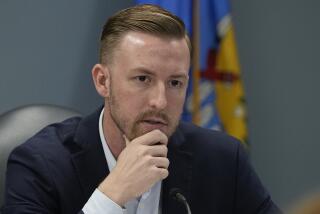Solicitor general surprises justices in religious schools case
Reporting from Washington â The Obama administration upset liberals as well as the presidentâs two Supreme Court appointees Wednesday by arguing that taxpayers had no right to sue the government if it used tax money to fund religious schools.
The surprising argument came in this termâs most important church-state dispute. At issue is the constitutionality of an unusual 13-year-old Arizona law that gives individuals dollar-for-dollar tax credits up to $500 for contributions to private organizations, which in turn allows taxpayers to direct a $500 tax credit to a private organization, which in turn pays tuition for students in private schools. More than 90% of the money goes to religious schools, the challengers said.
Acting U.S. Solicitor Gen. Neal Katyal joined Arizona in defending the law but went further, arguing that no one had legal standing to challenge it in court. Since no citizen could prove that âa cent ⦠of his money goes to fund religion,â no one had a right to sue over the alleged unconstitutional subsidy for religion, Katyal said.
Justices Ruth Bader Ginsburg and Stephen G. Breyer quickly objected. If no one can sue, there would be no way to enforce the 1st Amendmentâs ban on laws that foster âan establishment of religion,â they said.
Justice Sonia Sotomayor appeared to agree, commenting that âthis is the stateâs moneyâ going to private groups that fund only religious schools.
Justice Elena Kagan, Katyalâs boss until she joined the court in August, also objected to his argument. She ticked off a series of landmark rulings that rejected state aid to parochial schools. âSo, if you are right, the court was without authority to decideâ those cases, âbut somehow nobody on the court recognized that fact?â she asked.
âMy answer to you is yes,â he said.
At this, Justice Anthony M. Kennedy, a key swing vote, called for a pause. âI just want to make sure I heard your answer. Your answer is yes? Those cases were wrongly decided?â
Katyal said the court might have the right to say the states had wrongly subsidized religion, but he insisted no taxpayer had standing to sue.
Although technical, the issue of standing is crucial to the dispute. In the past, advocates of church-state separation have sued to object when a city, for example, puts a religious symbol on public property. But in recent years, the courtâs leading conservatives, including Chief Justice John G. Roberts Jr. and Justice Antonin Scalia, have questioned whether such people have standing because they cannot prove they were injured.
If the court were to agree with Katyal and broadly shield the government from legal claims that it is wrongly diverting public money to aid religion, the ruling could be far-reaching.
Liberal advocates said they were taken aback by the administrationâs stand.
âThe brief they filed is the same that would have been filed by the Bush administration,â said Erwin Chemerinsky, dean of the UC Irvine School of Law. âThere is no reason for the Obama administration to get involved in this case, let alone to take the conservative position that there is no standing.â
The Rev. Barry W. Lynn, executive director of Americans United for Separation of Church and State, called the administrationâs stand âinexplicable.â
More to Read
Get the L.A. Times Politics newsletter
Deeply reported insights into legislation, politics and policy from Sacramento, Washington and beyond. In your inbox three times per week.
You may occasionally receive promotional content from the Los Angeles Times.











